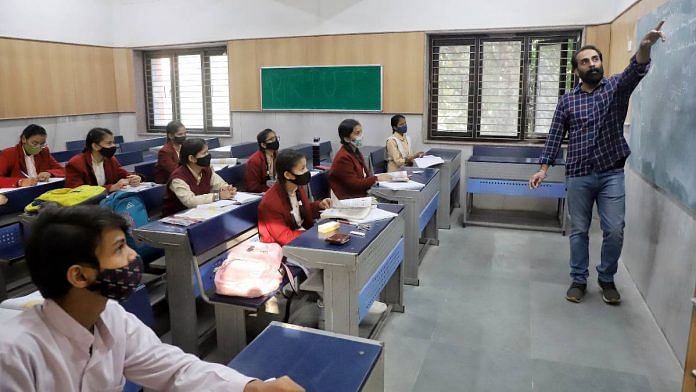New Delhi: Article 21A of the Constitution does not “guarantee” the right to receive education in the “mother tongue or home language”, while it contemplates the right to free and elementary education, the Rajasthan High Court has held.
However, the conversion of a Hindi medium school to English mid-session violates Article 19 (1) (a) of the Constitution (freedom of speech and expression) and cannot be permitted, a single judge bench of Justice Dinesh Mehta ruled, while setting aside Rajasthan government’s decision to convert Shri Hari Singh Government Senior Secondary School in Peelwa, Jodhpur district, to an English medium one in September, 2021.
Article 21A of the Constitution provides for “free and compulsory education to all children of the age of six to fourteen years”.
The HC judgment came on a petition filed by the parents of the school’s students and the School Development Management Committee (SDMC). It was submitted that the mid-session change in the medium of education was unconstitutional and in breach of students’ fundamental rights.
The parents maintained that they were not against English as a medium of instruction, but against the “complete conversion of the present institution.” The abrupt change, they said, would compel students to take admission in other schools during the academic session, which would affect their studies.
The Rajasthan state government maintained that the students could easily take admission in the several Hindi medium government schools in the same area.
Mentioning the policy decision of one English medium school in a village with a population of over 5,000 people, the government submitted that such a decision was permissible. However, the High Court rejected the contention, through an analysis of the applicable constitutional provisions.
Also read: Only 16 states/UTs teach underprivileged kids for free in pvt schools, child rights body finds
‘Cannot claim education in a language under Article 21A’
The Rajasthan HC, however, did not accept the petitioners’ contention that Article 21A covers the right to receive education in Hindi.
It held that the wording of the article is not absolute and allows for the state to determine the medium of instruction “by law” and referred to a 2014 verdict of the Supreme Court, which had decided on a similar vein.
“No child or parent can claim it as a matter of right, that he/his ward should be instructed in a particular language or the mother tongue only, based on what has been guaranteed under Article 21A of the Constitution,” the court held.
Right To Education fundamental right under Article 19 (1)
However, at the same time, the court recognised that it could not be held that the right to education is not covered by any of the fundamental rights and stated that it is part and parcel of Article 19 (1) (a), which provides for the freedom of speech and expression.
The bench proceeded to examine the restrictions provided by Article 19 (2), holding that the state government’s decision in the present case, which was purely administrative, is not a “reasonable restriction” under the meaning of Article 19 (2).
Clause (2) can only be invoked “in the interest of sovereignty and integrity of India, the security of the state, friendly relations with foreign states, public order, decency or morality or concerning contempt of court, defamation or incitement of an offence,” the court said.
The decision of the state government, therefore, could not “whittle down” a child’s right under Article 19 (1) (a) to be educated in Hindi.
‘Violates students’ right to equality’
Justice Mehta additionally noted that the student body comprises pupils from marginalised communities, a substantial portion of which are girl students. The state government’s move, thus, would lead to a number of students having to leave the school.
“Scooping out 601 students with one stroke of the pen in the assurance of being accommodated in nearby schools is violative of their constitutional rights,” the court noted.
The decision of the state government would also violate Article 14, which provides for the “right to equality”, as the decision was not based on any research or intelligible criteria.
The court also noted that education was covered by the Concurrent List of the Constitution, containing subjects where both the Centre and state are competent to legislate.
The Right To Education Act, 2009, provides that “as far as practicable, the medium of instruction be in the mother tongue/home language”.
Considering this, Justice Mehta said that English as a medium of instruction cannot be thrust upon a child by state legislation, let alone by a policy or administrative decision, as in the present case.
He further stated that such a transition would also be contrary to the National Education Policy, 2020 and provisions of the RTI Act. However, since the policy decision itself was not disputed and the SDMC had approved the decision “in principle”, it held that the school may proceed with the transition in the next academic session if a majority of the SDMC members approved of such an action.
Terming such transformation into an English medium school in the middle of the session “dehors the power of the State” (is outside the power of the state), the court dismissed the petition.
(Edited by Saikat Niyogi)
Also read: Over 2.9 crore children in India don’t have access to digital devices, govt report reveals



